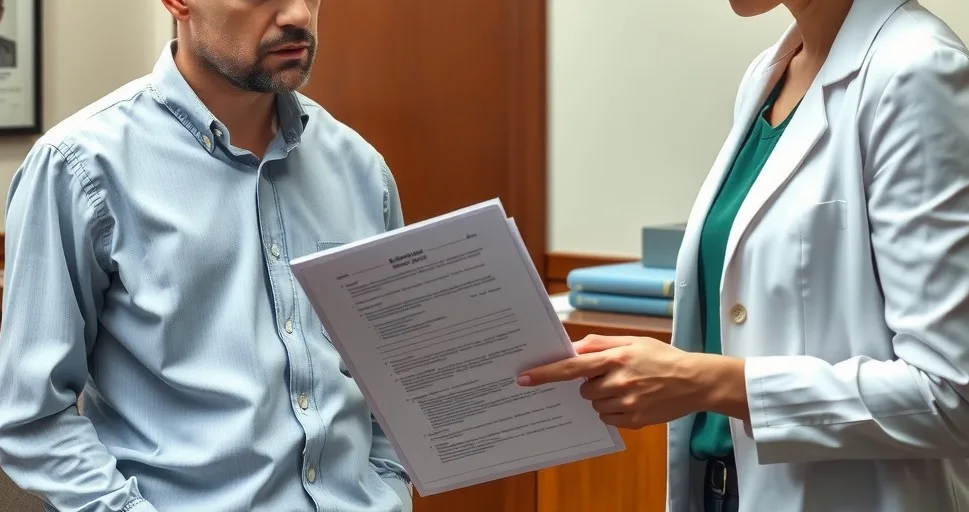Every day across America, patients have procedures without fully understanding what they have been told. In fact, studies show that 40 to 80 percent of medical information from doctors is forgotten almost immediately. When hospitals don't ensure that people truly understand medical information, patients suffer. That's where getting fast legal help makes all the difference.
At Gould Injury Law, we move fast to protect patients who have been harmed by poor informed consent. In this article, we will help you better understand informed consent and how to protect your rights.

What Is Voluntary Informed Consent?
The informed consent process creates a legal agreement between you and your doctor. This process protects your right to make decisions about your own body and medical care.
Voluntary informed consent requires your doctor to share specific information with you before any treatment begins. Your doctor must explain your medical condition clearly without using complicated medical words.
Your doctors should also describe all treatment options available for your situation. When they fail to do this properly, seek legal help to protect your rights.
What Doctors Must Include in the Informed Consent Process?
Doctors must follow specific rules when explaining medical information to patients. Medical institutions have the responsibility to honestly and clearly communicate medical information. Patients shouldn't have too much trouble understanding this document.
The informed consent process must include the following:
- A professional translator, if there are language barriers
- A written consent form matching what they tell you verbally
- Simple language instead of complex medical terms
- Enough time for patient questions and decisions
- Complete information about all available treatment choices
Common Ways Doctors Violate Informed Consent
Some doctors might break informed consent rules. These violations often happen when hospitals care more about speed than patient safety and proper communication. Each informed consent violation can be the foundation for a strong malpractice lawsuit.
Here are ways doctors may violate informed consent:
- Poor explanations: Staff give patients forms to sign without explaining what they mean
- No discussion of options: Doctors don't tell patients about other treatments that might work better
- Hiding risks: Medical staff downplay serious dangers to make procedures seem safer
- Complex language: Doctors use medical terms to avoid clear discussions about risks
- Rushing patients: Staff pressure patients to sign quickly without time for questions
These violations can create legal problems for healthcare providers. If you feel your healthcare provider failed in obtaining informed consent, seek legal help fast.
How Poor Consent Processes Harm Patients
Patients suffer real harm when doctors fail to follow proper medical ethics. Harm to patients from poor informed consent can take many forms, for instance:
- Patients may receive medical treatment they would have refused if they understood the risks involved
- Patients might miss out on better treatment options that their doctors never mentioned during consent discussions
- Patients may face unexpected complications that could have been avoided
- Patients may incur additional medical expenses that should have been mentioned
- Patients may experience worse health outcomes
- Patients might lose trust in their healthcare providers and the medical system overall
These situations create both physical and financial harm. Such situations can be avoided when proper informed consent discussions are had.
Legal Requirements for Valid Medical Consent
The problem many patients face is not knowing what laws protect them. But the legal system is on your side. Courts evaluate informed consent cases based on whether doctors met specific legal standards and medical ethics.
Federal laws governing medical consent
Medical consent laws are complex and vary by location. Different levels of medical care have different consent standards.
At the federal level, informed consent requirements are primarily established through the United States Department of Health and Human Services (HHS) regulations. These rules are found in section 45 CFR Part 46 (Protection of Human Subjects).
These regulations require that patients or research subjects in clinical trials receive:
- A clear explanation of the nature and purpose of the procedure or research
- A description of reasonably foreseeable risks or discomforts
- A statement of potential benefits
- Disclosure of appropriate alternatives, if any
- An explanation of confidentiality protections
- Contact information for questions or in case of injury
- A statement emphasizing that participation is voluntary and can be withdrawn at any time without penalty
How state laws affect your consent rights
Some states use what's called the reasonable patient standard. This means doctors must share information that a typical patient would want to know. Other states use the professional standard (also called the reasonable physician standard). This standard is based on what information most doctors in the field would share.
In certain states, medical boards or panels have created specific lists. These lists detail what must be shared for certain procedures.
Both federal and state laws recognize limited exceptions, such as emergencies where the patient is incapacitated. In these cases, immediate treatment is necessary to prevent serious harm or death.
What Makes a Consent Form Legally Binding?
A legally binding consent form must contain certain information. This information must be written in words you can understand.
Your signature on the form proves you received and understood the information about your proposed treatment. However, the written rules go beyond just getting a signature on paper. Courts look at several key factors when deciding if consent is valid.
These factors may include:
- Voluntary consent process without pressure
- Real patient-provider communication
- Complete records of risks and benefits explained
- Records of professional translator services
- Consent forms matching what doctors said verbally
When Consent Violations Become Malpractice Cases
Medical malpractice claims often center on failures in the informed consent discussion. They don't always focus on surgical errors. When doctors fail to explain risks that later cause serious harm, patients have the right to pursue fast legal action.
Gathering evidence for informed consent lawsuits
Picture walking into a courtroom knowing you have a rock-solid case. This happens because your lawyer moved fast to gather all the necessary evidence.
Evidence a lawyer can help you gather for your malpractice lawsuit includes:
- Records showing your doctor rushed through explanations or used confusing medical terms
- Medical records showing missing information
- Medical evidence linking your injuries to risks you were never warned about
- Witness statements from family members or staff who saw doctors hurry you through consent forms
At Gould Injury Law, we work fast to build these cases. We help gather the expert testimony and evidence needed to seek justice and win your case.
Compensation you can recover for consent violations
If you have suffered harm because you weren’t fully informed about your treatment options, you may be able to recover compensation. In these cases, the court looks at whether you would have made a different decision if you had been given all the necessary information. This helps determine the amount and type of damages you may be entitled to receive.
Some damages you may be entitled to include:
- Medical expenses
- Lost wages
- Physical/mental pain and suffering
- Loss of enjoyment of life
- Inability to participate in activities and hobbies
- Permanent disability damages
- Loss of consortium
Why Fast Legal Action Makes All the Difference
When medical malpractice occurs, time becomes your most valuable asset. The longer you wait to take legal action, the harder it becomes to build a strong case. Evidence disappears, witnesses' memories fade, and hospitals have more opportunity to strengthen their case.
Acting quickly provides several critical advantages:
- Evidence preservation: Medical records, equipment logs, and digital files remain intact and unaltered
- Witness availability: Healthcare staff and visitors can provide clear, detailed accounts
- Fresh documentation: Initial incident reports and communications haven't been influenced by legal concerns
- Statute of limitations protection: Ensures your case is filed within the required legal timeframes
- Stronger negotiating position: Early action demonstrates serious intent and prevents defensive maneuvering
Medical institutions are well-versed in protecting themselves once they expect legal challenges. They have protocols in place to consult legal teams and ensure their interests are protected. Your best chance of securing justice lies in moving fast before these defensive measures take full effect.
If you suspect informed consent violations, don't let valuable time slip away. Early legal help can mean the difference between a successful outcome and a case that becomes increasingly difficult to prove.
Take Action to Protect Your Medical Rights With Gould Injury Law
Learning about informed consent keeps you safe in future medical situations. It also helps you recognize when your rights have been violated.
You have the right to understand your treatment options before making any medical decisions. Don't let doctors rush you through important choices about your health and safety.
When doctors fail to respect your consent rights, call 888-WIN-FAST right away. Contact us for fast, aggressive legal representation. At Gould Injury Law, we move faster than anyone to protect patients. Our priority is to hold negligent healthcare providers accountable. Your rights matter, and your health matters.
